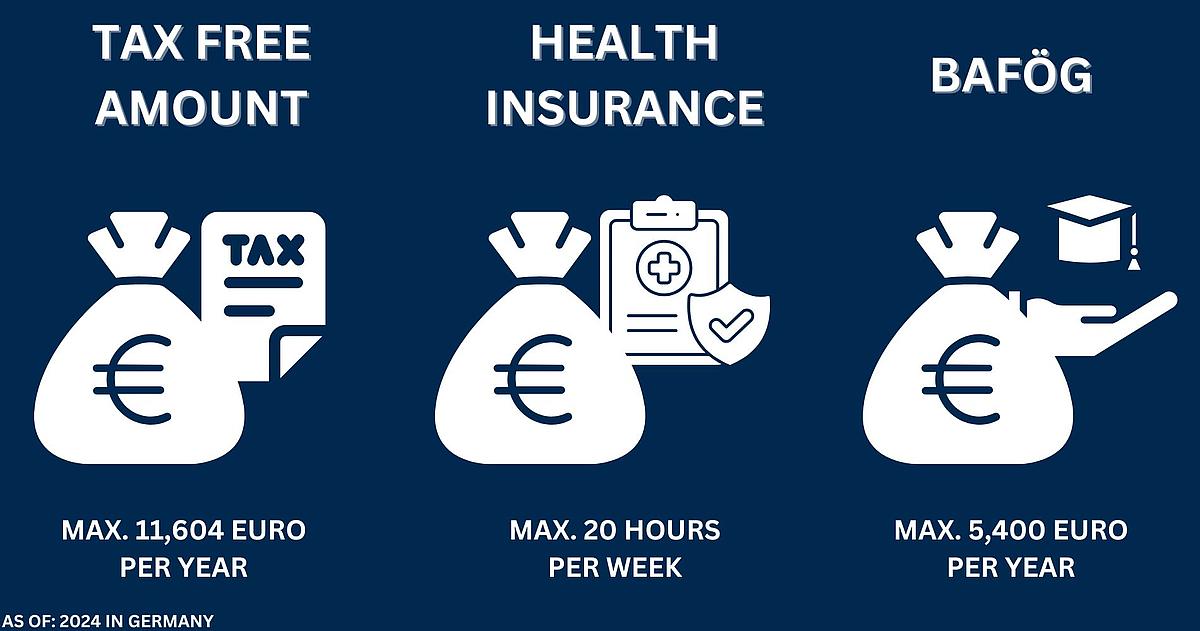This Website uses cookies to improve your visit on our website. More Info
Working alongside your Studies
Working alongside your studies not only opens up financial scope for students, but also career prospects. However, important rules must be observed: from weekly working hour limits and tax aspects to the effects on BAföG and social insurance. These requirements are designed to ensure that the focus remains on the study and that the work experience is enriching without jeopardizing academic success. An informed balancing act between study and work can set the course for a successful career.
Why work alongside your Studies?
Juggling study and work is an art that many students have to master. On the one hand, working alongside your studies offers a valuable opportunity to gain practical experience and financial independence. On the other hand, it is a challenge where time management and prioritization are crucial. However, this balancing act between academic commitments and professional activity can set the course for a successful future.
People choose to work alongside their studies for a variety of reasons. One main reason is often the financial need to cover tuition fees, rent, food and other living expenses. In addition, a part-time job offers the opportunity to gain valuable professional experience and apply the knowledge gained during your studies in practice. It is also a chance to develop new skills that can be useful in later professional life, such as teamwork, time management and self-organization. Many students also use working alongside their studies to build professional networks and gain insights into potential career paths. In short, working while studying is an enriching experience that promotes financial independence as well as personal and professional growth.
Working alongside your Studies: Pros and Cons
Working alongside your studies not only has advantages, but can also have disadvantages. Some of the pros and cons of working alongside your studies are summarized in the following table:
| Advantages | Disadvantages |
|---|---|
| Financial independence and support | Time burden and possible interference with studies |
| Practical experience in the professional field | Less free time and relaxation phases |
| Development of key skills (e.g. time management, teamwork) | Stress and increased workload due to double burden |
| Building professional networks and contacts | Possible conflicts during examination phases and working hours |
| Application and deepening of knowledge acquired during studies | Restriction of student activities and social life |
Working alongside your Studies - The most important questions and rules
In the following section, we have compiled and answered all the questions and rules that are important in connection with working alongside your studies.
How much can you earn as a student in Germany?
The question of how much you can earn as a student in Germany while working alongside your studies depends on various factors, in particular the tax free amounts, health insurance and the BAföG (Federal Training Assistance Act) in Germany.
- Tax free amount (as of 2024): In 2024, the basic tax-free allowance in Germany is €11,604 per year. Income up to this amount is tax-free, provided there is no other income.
- Health insurance: As a student, you can remain insured under the student health insurance scheme if you do not work more than 20 hours per week during the semester. You can also work more hours during the semester break.
- BAföG: For BAföG recipients, the income limit is 5,400 euros per year (as of 2023/2024). Earnings above this amount can lead to a reduction in BAföG benefits.
It is important to note that these amounts and regulations are subject to change, so it is advisable to check with the relevant authorities or on current information websites if you are interested in working alongside your studies.
How much can you earn as a student in Germany? - An overview
We have created a small graphic to make it easier to remember the most important aspects of student earnings when working alongside your studies. In 2024, the following three things are important in connection with working while studying:

How much can a student earn to remain covered by family insurance in Germany?
In order to remain covered by family health insurance as a student in Germany, your total income from work in addition to your studies must not exceed a certain amount. As of 2024, this income limit is 505 euros per month for marginal employment. In the case of employment for which social security contributions are paid, the regular monthly income may not exceed 538 euros.
However, these limits for working alongside your studies may change, so it is important to check with the relevant health insurance fund or current sources of information about the applicable regulations.
Working as a student: Taxes in Germany
As a student working alongside your studies, you must observe certain tax regulations. Here are some important points:
- Tax-free allowance: In Germany, there is an annual basic tax-free allowance up to which income remains tax-free, as already explained above. For the year 2024, this amount is 11,604 euros. If you earn less than this amount per year as a student, you generally do not have to pay income tax.
- Income tax: If you are employed and your income exceeds the tax-free amount, income tax will be paid. However, this can often be partially or fully refunded by submitting a tax return if your actual income does not exceed the basic tax-free allowance.
- Working student regulation: As a working student, you can work up to 20 hours per week during the semester without increasing your social security contributions. You can also work more during the semester break. To qualify for this regulation, you must be enrolled, and your studies must not be conducted as distance, part-time or evening studies.
- Mini-job: In a mini-job (450-euro job), you do not pay taxes or social security contributions, but the employer pays a flat rate to the mini-job center. Your earnings from such a job remain tax-free as long as you remain under the 450 euro limit per month.
- Self-employment: If you work on a self-employed basis, you have to pay tax on your income yourself and take care of your social security contributions. Different tax-free amounts and regulations apply here.
It is important that you declare yourself correctly on your tax return and, if necessary, consult a tax advisor in order to meet your tax obligations and optimize possible repayments. Explanations of the individual forms of work follow in another section.

How much can you work as a student in Germany?
As a student, you are generally allowed to work as much as you want as long as your studies do not suffer and you comply with the legal regulations. However, there are certain limits for working alongside your studies that are relevant for various aspects:
- 20-hour rule
During the semester, you are allowed to work up to 20 hours per week without changing your status and without any negative impact on your social security contributions. This rule allows you to be covered by statutory health, long-term care and unemployment insurance at a reduced rate as a working student. - Full-time during the semester break
You can also work more than 20 hours per week during the semester break, as this time does not count as part of the regular semester. - Health insurance
As a student with statutory health insurance, you must stay under the 20-hour limit during the semester in order to keep the discounted insurance rate.
Note that your work alongside your studies should not be so extensive that it interferes with your main occupation - your studies. It is important to find a good balance so that your academic performance does not suffer from the additional workload.
What happens if you work more than 20 hours as a student in Germany?
If you work more than 20 hours a week as a student in Germany alongside your studies, this has various effects on your status, your social security contributions and possibly on your academic achievements. Here are the most important points:
Social Insurance
If you regularly work more than 20 hours per week, you no longer fall under the regulations for working students. This means that you will be fully liable for social insurance contributions. This includes contributions to health, long-term care, pension and unemployment insurance, which must then be paid by both you and your employer.
Health Insurance
If you regularly exceed the 20-hour limit, you may have to take out private health insurance or switch to regular statutory health insurance, which is usually more expensive.
Tax Implications
More work alongside your studies can also mean higher income, which can have tax consequences. However, the basic tax-free allowance remains the same. If your income is higher than this, you will have to pay income tax.
BAföG
If you receive BAföG, exceeding the 20-hour limit can have an impact on your funding. There is one, and higher income can lead to a reduction or suspension of BAföG payments.
Residence Permit
International students who have a residence permit to study are generally allowed to work a maximum of 120 full days or 240 half days per year. More work alongside your studies can lead to problems with your residence permit.
Conclusion
It is important to find a balance between work and study and to observe the legal regulations in order to avoid negative effects.
Working and studying full-time in Germany
Working full-time and studying at the same time is a big challenge, but it is possible. Many people choose this path for financial reasons, to gain work experience or to advance their career. Here are some tips on how it can work to work full-time while studying:
| Choose a flexible study model | Distance learning, evening studies or part-time studies offer the flexibility you need to work full-time. These study models are designed to accommodate working people. |
|---|---|
| Time management | Effective time management is crucial. Planning and prioritization help to balance study, work and leisure. Use calendars and planning tools to organize your time efficiently. |
| Employer support | Some employers support their employees' studies, for example through flexible working hours, home office options or financial support. It is worth talking to your employer. |
| Use of vacation days | It can be helpful to use vacation days during examination phases or important deadlines in your studies so that you can concentrate fully on your studies. |
| Efficiency in study | Use resources such as online lectures, digital libraries and study groups to make learning more efficient. Applying what you have learned directly at work can also help you to internalize the material better. |
| Health and well-being | Make sure you get enough rest and take breaks to avoid overwork and burnout. Sports, hobbies and social activities are important to maintain your mental balance, even if you are working alongside your studies. |
| Set realistic goals | Be aware that full-time work and full-time study can be a huge burden. Set realistic goals and be prepared to make adjustments if necessary. |
It requires discipline, organization and a willingness to make sacrifices. Not everyone finds this model practicable or fulfilling, so it is important to realistically assess your own limits and possibilities.
Working with a scholarship allowed in Germany?
Whether you are allowed to work alongside a scholarship depends on the specific conditions of the scholarship provider. Many scholarship programs allow scholarship recipients to pursue work while studying, but may impose certain conditions or set income limits to ensure that their studies remain a priority. Here are some general guidelines:
- Review scholarship conditions: It's important to read the terms of your scholarship carefully. Some scholarship providers explicitly state how much you are allowed to work part-time or if there are restrictions on income while working alongside your studies.
- Income limits: Some scholarships have income limits that must not be exceeded in order to keep the scholarship. The additional income from working alongside your studies could raise your total income above this limit.
- Impact on your studies: Even if working alongside your studies is allowed, scholarship providers usually expect your studies to take priority and be successfully completed. Excessive working hours could affect your academic performance and therefore indirectly your scholarship eligibility.
- Communicate with the scholarship provider: If you are unsure, it is advisable to communicate directly with the scholarship provider. They can provide clear guidelines regarding working alongside your studies on scholarship.
- International students: If you are an international student receiving a scholarship, you must additionally observe the work regulations associated with your visa or residence permit.
In summary, working while studying on a scholarship is often allowed, but it is important to know and adhere to the specific rules and conditions of your scholarship.

Forms for working alongside
your studies at a glance

| Type of work | Description |
|---|---|
| Part-time job | Any type of employment alongside your main job or studies, can include mini-job, working student job or freelance work. |
| Minijob (450-euro job) | Marginal employment with an income of up to 450 euros per month, generally exempt from tax and social security contributions. |
| Midijob | Employment subject to social security contributions with an income of between 450.01 euros and 1,300 euros per month, with reduced social security contributions. |
| Freelance work / self-employment | Self-employed work in your own business or freelance activities, income and tax liability vary. |
| Internship | Temporary work in companies, often as part of studies or for work experience, can be paid or unpaid. |
| Student assistant / research assistant (HIWI) | Work at the university in research, teaching or administration, usually related to the field of study. |
| Teaching activities (e.g. tutorials) | Supporting lecturers in teaching courses, usually paid by the university. |
| Working student activity | Employment in a company related to the field of study, subject to social insurance contributions, up to 20 hours per week during the semester. |
| Voluntary work | Voluntary work in non-profit organizations, associations or projects, usually unpaid, but valuable for personal development. |
| Vacation job | Seasonal work during the semester break, can be in various industries. |
| Short-term employment | Employment that is limited to a maximum of three months or 70 working days in the course of a calendar year, without compulsory social insurance. |
Forms of work alongside your Studies explained in more detail
Working alongside your studies can look very different and come in different forms. Below, each form of work is explained in more detail and an example of this type of work alongside your studies is given:
1. Part-time Job
Part-time jobs are a general form of employment that is pursued alongside a main commitment such as study. They cover a wide range of activities and offer students the opportunity to earn additional income.
Example: A music student gives private guitar lessons to finance his studies and gain practical teaching experience at the same time.
2. Mini Job (450-Euro Job)
Mini-jobs allow students to earn up to 450 euros a month tax-free without being fully liable for social security contributions. These flexible jobs are ideal for earning money alongside your studies without any major obligations. A mini-job can also be chosen independently of your studies.
Example: An art student works at a gallery at weekends alongside her studies. There she assists with the organization of exhibitions and customer service. This job not only gives her an insight into the art scene, but also allows her to work flexible hours that fit in well with her study schedule.
3. Midi Job
A midi job is characterized by a monthly income of between 450.01 euros and 1,300 euros. In this employment relationship, you pay reduced social security contributions, which offers a financial advantage over full-time employment without having to forego social security.
Example: A communication science student works part-time in the public relations department of a small company, improves their skills in the field of media communication and benefits from a regular income with social security.
4. Freelance Work / Self-Employment
Freelancers or self-employed persons offer their services or products on their own account. This form of work requires a high degree of initiative, self-organization and entrepreneurial spirit.
Example: A journalism student writes articles for various online magazines as a freelancer. This work alongside his studies gives him the freedom to organize his own working hours and at the same time build up a network in the media industry.
5. Internship
An internship offers the opportunity to gain work experience in a company or organization for a limited period of time. Many degree courses include internships as an integral part of the curriculum.
Example: A business administration student completes a three-month internship in the marketing department of a large consumer goods manufacturer. There she not only learns the practical application of marketing strategies, but also how to use industry-specific software.
6. Student Assistant / Research Assistant
As a student or research assistant, you will support the teaching staff or researchers at your university or college. These positions allow you to delve deeper into your subject area and gain valuable academic experience.
Example: A physics student works alongside their studies as a research assistant on a particle physics research project. He helps with data analysis and thus gains deep insights into current research questions.

7. Teaching Activities (e.g. Tutorials)
Students who lead tutorials or exercise groups support their fellow students in learning and at the same time deepen their own understanding of the subject matter.
Example: A Master's student in mathematics gives tutorials for Bachelor's students in analysis. This work alongside her studies not only strengthens her pedagogical skills, but also her specialist knowledge.
8. Working Student Activity
As a working student, you work in an area related to your field of study and can work up to 20 hours per week during the semester. This position offers the opportunity to gain professional experience, build networks and put theoretical knowledge into practice while benefiting from reduced social security contributions.
Example: An engineering student works alongside their studies in the development department of a technology company, where they work on the design of new products, which not only gives them practical experience in their field, but also valuable insights into company processes.
9. Volunteering
Voluntary work offers the opportunity to get involved in society and develop personal and social skills in the process.
Example: A medical student is involved in the local rescue service organization in his free time. By doing this work alongside their studies, they gain practical experience in the medical field and make a valuable contribution to society at the same time.
10. Break Job
Break jobs are temporary jobs that are taken on specifically during the semester break in order to earn concentrated money.
Example: A humanities student works alongside their studies during the summer vacation at a publishing house and assists with manuscript editing.
11. Short-term Employment
Short-term employment is defined by a fixed-term employment period of a maximum of three months or 70 working days per year. They are particularly suitable for project-related work or seasonal activities. These jobs are exempt from social security contributions and offer flexibility.
Example: A sports science student works for a sports event company during the European Football Championships and assists with the organization and implementation of public viewing events.
How do I find a job alongside my studies?
Finding a job while you study requires some research and preparation. Here are some effective strategies:
| University and college resources | Many universities and colleges offer job boards, career centers or online platforms specifically designed for students. These can provide information about student jobs, internships and part-time work near campus. |
|---|---|
| Online job boards and career portals | Use specialized job boards and career portals that focus on student jobs, mini-jobs or internships. Websites such as Indeed, Monster, StepStone or LinkedIn offer extensive search options. |
| Network | Inform family, friends and acquaintances about your job search. Job opportunities often arise through personal contacts or recommendations. Networking events, trade fairs and workshops can also be useful. |
| Social media and professional networks | Use social media and platforms such as LinkedIn to build your professional network and get in touch with potential employers. Many companies also post their job vacancies on their social media. |
| Unsolicited applications: | If you are interested in a particular company or industry, don't hesitate to send an unsolicited application. Even if no position is advertised, your interest and commitment can make an impression. |
| Job fairs and career events | Attend job fairs and career events offered by your university or external organizations. These events offer a good opportunity to meet employers in person and introduce yourself directly. |
| Freelance work and self-employment | Consider whether you have skills or services that you can offer on a freelance basis. Platforms such as Upwork, Fiverr or Freelancer can provide an entry into self-employment. |
| Notice boards and local businesses | Look out for job notices at your university, in cafés or in local stores. Many smaller companies prefer to advertise their jobs locally. |
| Preparation and application documents | Make sure your CV and cover letter are up to date and tailored to the job in question. Practice for interviews to make a good first impression and find a job quickly alongside your studies. |
Through a combination of these strategies and with a little patience, you will hopefully find a suitable job that fits your studies and your schedule or simply a job that interests you alongside your studies.
What else should I look out for?

In addition to the specific regulations and conditions of the various forms of work, there are other important aspects of working alongside your studies that you should pay attention to as a working student:
- Work-life-study balance: make sure you find a healthy balance between work, study and free time. Overwork can lead to stress, burnout and health problems.
- Study priority: Don't forget that your main goal is to successfully complete your studies. Work should support this goal, not hinder it.
- Rights and responsibilities: Familiarize yourself with your rights and obligations as an employee. This includes working hours, vacation entitlement, notice periods and protection in the event of illness.
- Contractual conditions: Read your employment contract carefully and pay attention to the terms regarding working hours, pay and notice.
- Learning opportunities and career development: Choose a job alongside your studies that offers you valuable experience for your future career. Network and learn from your colleagues and superiors. This can also be helpful during your studies or afterwards.
- International students: If you are an international student, be aware of the specific work requirements of your visa or residence permit.
- Health and wellbeing: Don't neglect your physical and mental health. Make sure you get enough sleep, nutrition and exercise.
- Take care of yourself: Don't let the employee exploit you or argue away an unpleasant working atmosphere with the argument that it's just a student part-time job. If something isn't right or you don't feel comfortable, don't hesitate to make a change. There are plenty of new opportunities to find a job alongside your studies that suits you better.
By considering these additional aspects, you can ensure that your work experience alongside your studies is both enriching and sustainable.
Frequently asked questions about working alongside your studies
Yes, it is possible to work alongside your studies. Many students choose to take on a part-time job or work as a student trainee to supplement their income and gain practical experience. There are various options, such as university jobs, internships or jobs in the private sector. It is important to plan your working hours so that they do not interfere with your studies and to find out about any possible effects on BAföG or tax matters.
The number of hours that students work alongside their studies can vary greatly, depending on individual circumstances and the requirements of the course. On average, students work around 10 to 20 hours per week. However, there are legal limits and limits recommended by universities to ensure that work does not interfere with study. In Germany, for example, students who are employed as working students are allowed to work a maximum of 20 hours per week during the semester. They can work full-time during the semester break. The exact number of hours depends on personal goals, the study plan and the type of work.
Yes, it is possible to study part-time and work full-time at the same time. Many universities offer part-time study programs that are specifically designed for working professionals and offer greater flexibility in terms of lecture times and exam dates. These programs are designed to meet the needs of students who do not want to or cannot interrupt their professional activities. However, this combination requires a high degree of time management and organization to meet both commitments.
Yes, it is possible to work part-time while studying full-time. Many students choose this option to improve their income, gain work experience or help finance their studies. However, working hours should be planned in such a way that they do not negatively affect your studies, as your studies usually take priority. It is important to find a good balance between work, study and free time to avoid overworking.
As a student, you are not usually allowed to work full-time because the main aim of being a student is to complete your apprenticeship and successfully complete your studies. Full-time work could interfere with academic performance as it takes up significant time and energy that would otherwise be required for study, including lectures, studying and preparing for exams. There are also legal and insurance restrictions that limit the amount of work students can do in order to maintain their student status and the associated benefits, such as lower National Insurance contributions. These regulations are designed to ensure that students can complete their apprenticeship in a reasonable amount of time and are not prevented from doing so by excessive workloads.
Interested in a study program? Request our information material now!
More exciting degree programs in Munich













